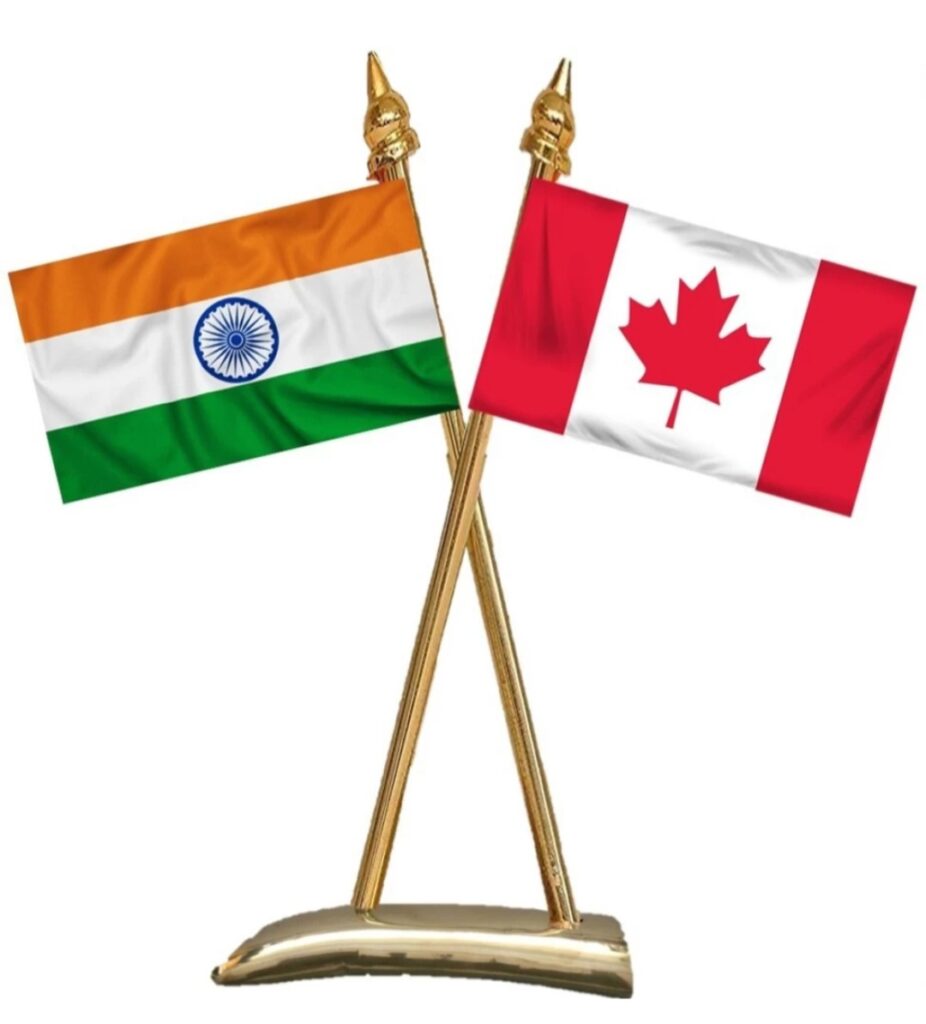By: Pritam Sarbabidya

Over the past few years, India and Canada have experienced a major diplomatic showdown. Bilateral relations have been blemished by diplomatic spats, reactionary frictions, and an overall sense of mistrust between the two nations. This sudden downturn in ties between the two democracies that have maintained a customary relationship has left many wondering about the implications for India’s foreign policy and the future of Indo-Canadian relations.
The History behind the ties
Canada and India have a connection rooted in their history as British colonies, which set the stage for their diplomatic ties. Their relationship began in the 1800s with people moving between the two countries and later on which grew into official diplomatic links after India gained independence. They set up formal diplomatic relations in 1947 starting a new phase in their two-way engagement backed by their shared belief in democracy and diversity. But this relationship has had its rough patches too, when it comes to issues about Sikhs living in Canada and India’s worries about the rising call for a separatist movement.
Canada’s significant Sikh population and the majority of their support for a sectarian movement against another sovereign state, has created problems for diplomacy over the years. In the wake of the most tragic and disturbing event of the 1984 Anti-Sikh Riots, a few sections of the Sikh diaspora in Canada found themselves at the forefront of a movement that has often been viewed with suspicion by the Indian side. Subsequently, the bombing of Air India Flight 182 back in the year 1985, made things more tough for both sides and a major concern in terms of security for India.
The Recent Tussle
The recent tensions started with Canadian Prime Minister Justin Trudeau’s allegations in September 2023, which claimed credible evidence linking Indian government agents to Hardeep Singh Nijjar’s murder on Canadian soil. The Indian side refuted such claims calling it “absurd”. What followed next was a climatic loop of diplomatic actions, further intensifying the existing rift. Canada’s accusation was followed by the expulsion of six Indian diplomats, at the same time India fired back by swiftly suspending Canadian diplomats, mirroring the concept of “Tit for Tat” diplomacy. The move by India exemplifies India’s fierce approach towards its foreign policy that prioritizes national interest, sovereignty, and security.
In the month of October, things got more complicated when the Canadian Government named the Indian High Commissioner and other diplomats as ‘persons of interest’, India’s Ministry of External Affairs (MEA) debunked the claims, stating “preposterous imputations” and blamed Canadian PM Justin Trudeau’s “political agenda” based on “vote bank politics”. Subsequently, New Delhi recalled its High Commissioner and other diplomats back to India.
The statement released by the Ministry of External Affairs on October 14, in response to diplomatic communication from Canada, can be described as extraordinarily ‘harsh’ and pinpointed. Many geopolitical or foreign policy commentators, for instance, Abhijit Iyer Mitra, a senior fellow at the Institute of Peace and Conflict Studies (IPCS) believed that such languages were not even used for countries like the state in mess, Pakistan.
It’s not India, but Canada.
The Indian Government time and again has mentioned the growing anti-India sentiments, and calculated attacks on Hindu temples in Canada, However, Ottawa overlooked all such diplomatic messages, even about the high chances of attacks on Indian diplomats. The series of attacks and threats show Canada’s failure to provide security and ensure the safety of Indian officials. This is not the first time, the Canadian PM’s action tried to poke the relationship negatively, back in the year 2020, he expressed ‘uninvited’ concern for the farmer’s protests, which is an ‘internal’ matter of India. Similarly, the Canadian Government has entertained serious anti-India activities like the glorification of the assassination of a former Indian PM, which shows how Canada takes the relationship with India seriously as a mature nation pursuing a relationship.
Turning a blind on such serious events not only hinders the relationship but also the notion of ‘interdependence’. Captivating separatist movements to pander to political gains will complicate foreign relations, as countries, in this case for India are a ‘deception’ of trust and an affront to India’s sovereignty. The path of resolving the tussle through ‘dialogue and discussion’ is also in question, which has always been the first step of ‘conflict resolution’ for democracies.
India’s immediate and reactionary stance signifies India’s adherence to strategic autonomy, a core principle of India’s foreign policy. This autonomy allows India to confidently address challenges from countries, irrespective of economic or diplomatic consequences, affirming that India is no longer willing to overlook actions that it perceives as baneful to its security and sovereignty. The whole India-Canada event also brings out a major argument, that cooperation through economic interdependence is not always effective when national security concerns are prioritized by countries. From the Canadian lens, the same can be visualized with the allegations stating ‘India, violated Canada’s sovereignty’. Thus, the way forward for the relationship requires a ‘matured’ stance, and calculated move, with an assurance of respect to the notion of ‘sovereignty’, and ‘national security’.


Baddiehub I just like the helpful information you provide in your articles